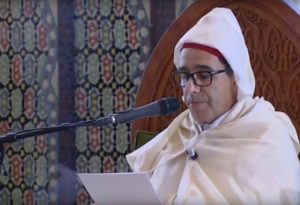Professor Hassan Azzouzi : Cooperation Between the Kingdom of Morocco and African Countries in the Fight Against Extremist Thinking and Terrorism

The lecture was given by Professor Hassan Azzouzi, Head of the Local Council of Oulema of the Province of Moulay Yacoub, on the theme “Cooperation between the Kingdom of Morocco and African countries in the fight against extremist thinking and terrorism”, drawing on Koranic verse “And cooperate in righteousness and piety, but do not cooperate in sin and aggression. And fear Allah; indeed, Allah is severe in penalty.”
The lecturer explained that cooperation in righteousness applies to anything that can serve religion and provide protection against terrorist thinking, considering that terrorism and what it entails as violence and destruction represent the sin and aggression that God forbade.
He also added that social necessity is a top priority for Muslims and for this they are in need of religious sciences for a correct understanding of religion, along with all its pillars’ requirements in relation with supervision and equipment, noting that the one in charge of Muslims’ affairs, as it is the case of the commandership of the faithful in Morocco, is responsible for meeting this need, otherwise any shortcoming in this area will be exploited by extremism and terrorism.
Professor Hassan Azzouzi underlined that even if some African countries chose constitutional secularism, the cooperation of the Kingdom of Morocco with them is a religious duty and part of the long-standing relations of brotherhood and good neighbourliness.
The lecturer underscored that the shared immutable values constitute a shield against terrorism and extremism, namely the Ashaarit doctrine, the Maliki rite and Sufism, adding that the said rite gives special importance to jurisprudence and preservation of general interest.
He went on to say that the unity of rite played such a crucial role in Africa that researcher John Hunwick described it as the gift of Morocco to African countries as it ensures peace mainly inside mosques.
The lecturer also emphasized that the kind of cooperation required is the one that protect people from extremism thinking as it does not stop at posing a threat to security and order, but also threatens the very religion of Islam, explaining that terrorist ideas finds sometimes a hotbed due to social and cultural precariousness.
Referring to possible cooperation between Morocco and African countries to address terrorism, the lecturer explained that cooperation should be in the form of partnerships in the area of institutionalization and regularization at the level of society, which requires coming up with solutions to meet democratic social demands.
At the end of the lecture, HM the King was greeted by several foreign religious figures.
